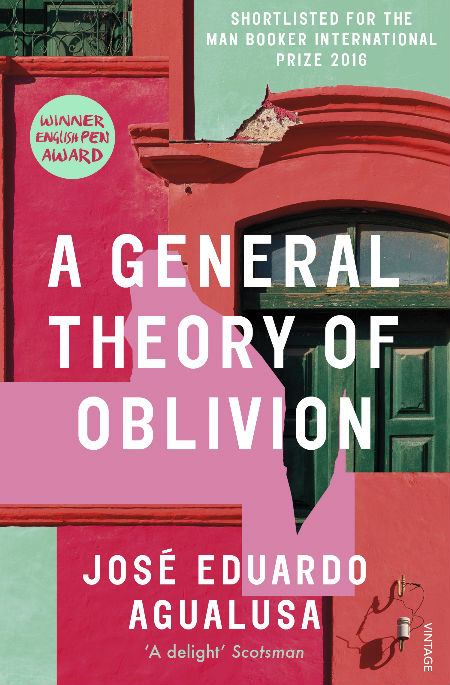
Combining both poetic lyricism and raw emotional vulnerability, A General Theory of Oblivion explores, with poignant insight and an unwillingness to wash everything in a romanticised sheen, what it is like to take a great big step away from the human race.
Through the protagonist, Ludovica Fernandes, who walls herself off in her Luanda apartment as the first throes of Angolan independence wreak their bloody havoc in 1975, and sundry other deeply-engaging interconnected characters, we come to understand what would cause someone to take time out from the messy, chaotic, hurly-burly of life, and why for all its eccentricity of premise, the move is underpinned with some profoundly-affecting motivations.
Agualusa’s masterstroke through every single part of this remarkably beautiful book is to take what could have been a quirky, one-joke premise – there really was a Ludovica Fernandes Mano who died in 2010; while the novel borrows from her diaries, the author assures us the narrative itself is pure fiction – and turn it a ruminative meditation on life, its many coincidental twists and turn, and its capacity to connect seemingly disparate moments into one interwoven tapestry.
“Ludovica never liked having to face the sky. While still only a little girl, she was horrified by open spaces. She felt, upon leaving the house, fragile and vulnerable, like a turtle whose shell had been torn off. When she was very small – six, seven years old – she was already refusing to go to school without the protection of a vast black umbrella, whatever the weather. Neither her parents’ annoyance nor the cruel mockery of the other children deterred her. Later on, it got better. Until what she called ‘The Accident’ happened and she started to look back on this feeling of primordial dread as something like a premonition.” (P. 3)
To be fair, when she bricks off her end of the hallway and erases her apartment from existence, Ludovica, or Ludo as she is often referred to, isn’t thinking about any kind of grand existential statement.
She simply sees her world falling apart her, one she barely knows to begin with thanks to her relatively immigration from Portugal with her sister Odette who falls in love and marries a local “businessman” Orlando – both of who disappear in mysterious circumstances at about the same time – and reacts in an impetuous but wholly sensible, as she sees it, way to stem the tide of destruction.
It’s a move that somewhat salves a great many psychological and emotional issues, thought she is acutely lonely, especially as she is forced to being burning her precious books for light and warmth, but which causes her a great deal of hunger, poverty, loss and deprivation; she is safe certainly, but at what cost?
To her great credit, she doesn’t simply close off her ruminations on that topic, spending copious hours as her eyesight dims and her paper supplies ebb to the point where she is writing on the walls, musing on what has driven her to this point and what it all means.
It doesn’t put food on the table true – that comes courtesy of trapped pigeons, lured to the terrace of her expansive apartment by the sunlit glitter of diamonds left by Orlando – nor does it give her power or water, both of which become perilously unavailable in the post-independence but it does help make sense of her vastly-reduced world.

As Ludo struggles to get through thirty years of Garbo-esque seclusion, high atop her rapidly-dilapidating apartment block, a cast of characters play out their stories, each of them connected in ways tenuous and painfully direct to each other.
Each of them from onetime police agent of the new repressive socialist regime, now private detective Monte to criminal-turned-reborn man Jeremias Carrasco to Little Chief, a socialist revolutionary who falls afoul of the new powers that be but ends up rich and unwittingly living next to Ludo, play a part, directly or indirectly, in Ludo’s heavily-circumscribed life.
Throughout the pages of what is, for all its relative brevity, a narratively sprawling book that takes in vast sweeps of time and human experience, we come to understand how even when you take a step back from the human race, that you can’t ever truly leave it.
Indeed, when some 28 years later, a 7 year old boy named Sabalu sneaks into Ludo’s apartment via scaffolding erected to gentrify the apartment block next door – socialism is out and capitalism, once again, is in – the reclusive old woman comes to understand the truth of the connectivity of all people.
“If I still had the space, the charcoal, and available walls, I could compose a great work about forgetting: a general theory of oblivion.” (P. 100)
A General Theory of Oblivion, which is punctuated with exquisitely poetic rumination on life courtesy of Ludo’s diary entries, and on two occasions by the emotionally-resonant poetry of Christiana Nóvoa, doesn’t treat this connectivity as some fey morality lesson or glib observation.
Through the experiences of Ludo, Sabalu and so many other engaging people, we come to appreciate that these connections promise as much pain as they do pleasure, that the inherent warmth and love of Monte and his wife Maria Clara is balanced by those who want the former agent of the state, noble though he might be, dead and buried.
It’s this yin and yang of community, and how Ludo, for the most part, seems to have mostly, but not completely, lost out in the roll of its dice, that anchors this luminous, enriching, insightful and beautifully well-written meditation on how being connected to others can both lift and elevate us, while dragging us down and taking to places we might never have imagined, such as a walled-off apartment for 30 years.
That her seclusion is not the end of the story, thanks to Sabalu’s unexpected intrusion, is not necessarily the point of the story; A General Theory of Oblivion is less about where it all leads, though that is important, and more about what happens to us, and those around us, while we are getting there, and the way in which forgetting does not erase the events of our life and the links these create to the people near and far from us.